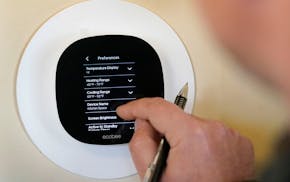Four years ago, Synovis Life Technologies Inc. hired Richard Kramp to resuscitate its ailing interventional business, which made components for other medical device firms.
Four months ago, Kramp, now CEO, sold that business.
Such is the topsy-turvy life of St. Paul-based Synovis, a company that has seen countless reinventions and comebacks in its 23-year history.
But Kramp, a veteran executive at ATS Medical and at St. Jude Medical, insists that Synovis has found a winning niche: developing implantable "biomaterial" that helps the body repair and regenerate damaged soft tissue. Kramp decided that task would be made easier without the interventional business.
Synovis' signature technology, Veritas, consists of converting cow tissue into a type of scaffolding that attracts the body's own cells and blood vessels, allowing the body eventually to remodel the repaired tissue type. Synovis hopes doctors will use Veritas to help repair kidneys, bladders, breasts, and eventually, hearts.
"The story is that we are now a pure-play, tissue-repair company," Kramp said. "We think this is the big part of the future of the company."
So far, the numbers bear out Kramp's optimism. Last year, biomaterial sales rose 36 percent, to $27.2 million. By contrast, interventional sales increased 7.4 percent, to $30.2 million.
Senior portfolio manager Matt Arens praised the decision.
Arens, of Edina-based Kopp Investment Advisors, called the exit from contract manufacturing "absolutely the right move."
Kopp has been purchasing Synovis stock aggressively. It owns 183,505 shares, up from 34,850 shares last year.
Synovis entered the biomaterials business in 1994 with its Peri-Strip tissue patches, used to reduce bleeding and leaks in patients who'd had lung-reduction surgery to treat emphysema. The company later applied Peri-Strips to gastric bypass surgery.
But Peri-Strip sales declined because of increased competition and Medicare's refusal to pay for the product's use. In 1998, Synovis entered the interventional business with its purchase of Jer-Neen Manufacturing Co. At the time, the acquisition gave Synovis much needed diversification and "pizazz" on Wall Street, Kramp said. But the business recently was a drag on results.
"Every time we presented to investors, they would say, 'We love the story, each element looks good, but put them together and it's very confusing,'" Kramp said.
Synovis Chief Financial Officer Brett Reynolds said that contract manufacturing had high fixed costs, lower margins and lots of volatility. Synovis' customers were cardiac rhythm management companies that make devices such as pacemakers and implantable cardioverter defibrillators.
Recalls and safety concerns of those devices hurt sales. So in January, Synovis sold the interventional unit for $29.5 million. Kramp plans to use the cash to develop soft-tissue technology, especially Veritas.
The 'holy grail'
One of Veritas' best advantages is that it transforms into the tissue it's repairing, leaving no trace of the original cow tissue, Kramp said. That means that the body doesn't reject the implanted biomaterial. While he envisions several applications for Veritas, he has his eyes set on the 5 million people in the United States who suffer from congestive heart failure, which he considers the "holy grail" of the soft-tissue market.
"Our experience with an animal-based tissue in the human body is among the longest there is, and we have never had a problem," Kramp said. "We are building a reputation of having good products and knowing what we are doing, and that puts us in the unique position to step into the heart."
In a heart attack, scar tissue forms on the organ. As that tissue is essentially dead, the rest of the heart works harder to compensate. The resulting strain can lead to heart failure.
Normally, doctors would prescribe drugs or implant a device on the heart, said Dr. Rob Simari, chairman of cardiology research at the Mayo Clinic. He is not affiliated with Synovis.
But lately "there has been a lot of interest in ways to directly help the heart remodel by putting [biomaterials] into the area to provide a buttress," Simari said. "It's very exciting."
"Medical device companies are very interested in acquiring biomaterials," Arens said. "It's a very hot area in the market. I think Synovis is in very good shape, both as a stand-alone company and a nice acquisition candidate." Thomas Lee • 612-673-7744

